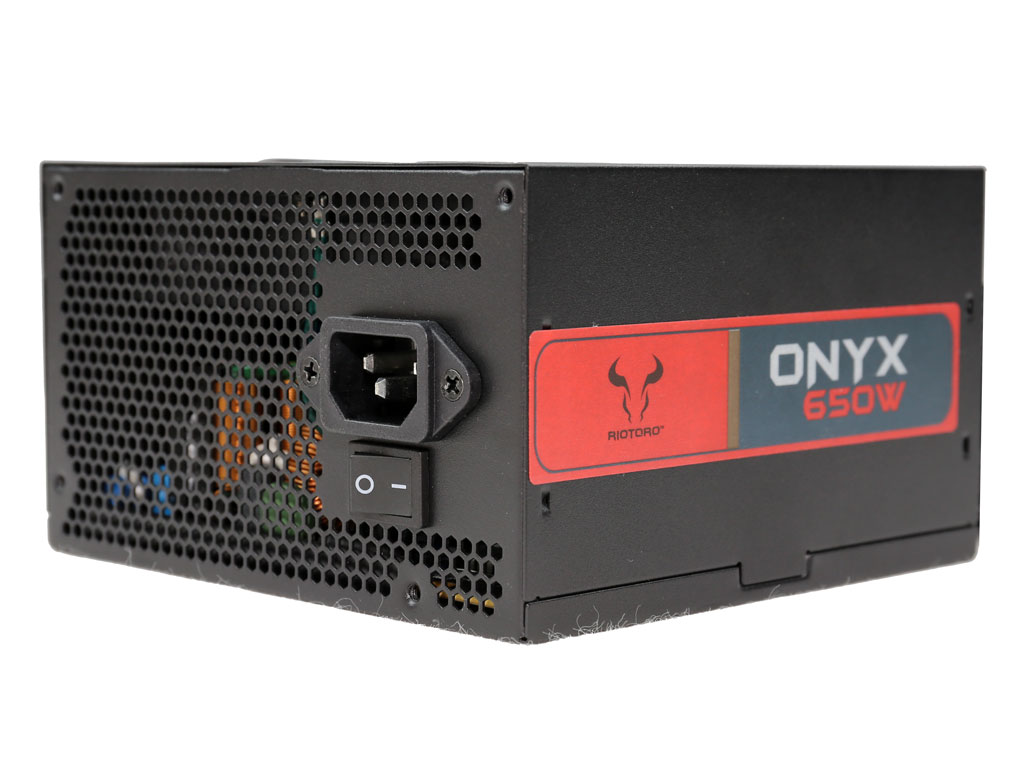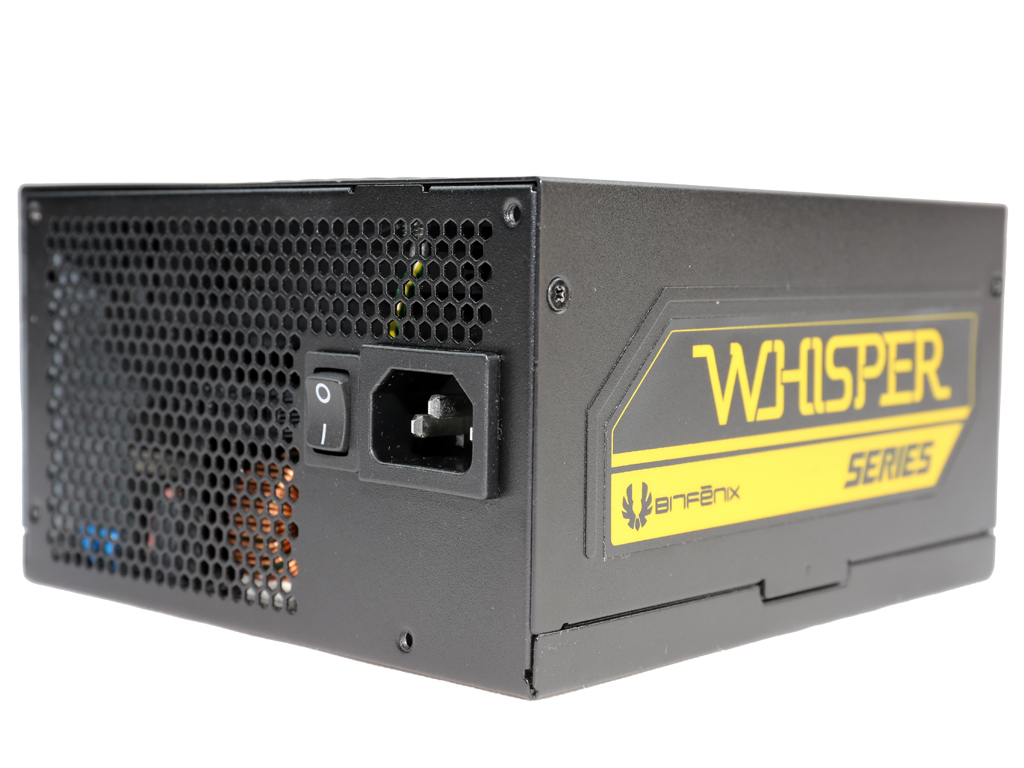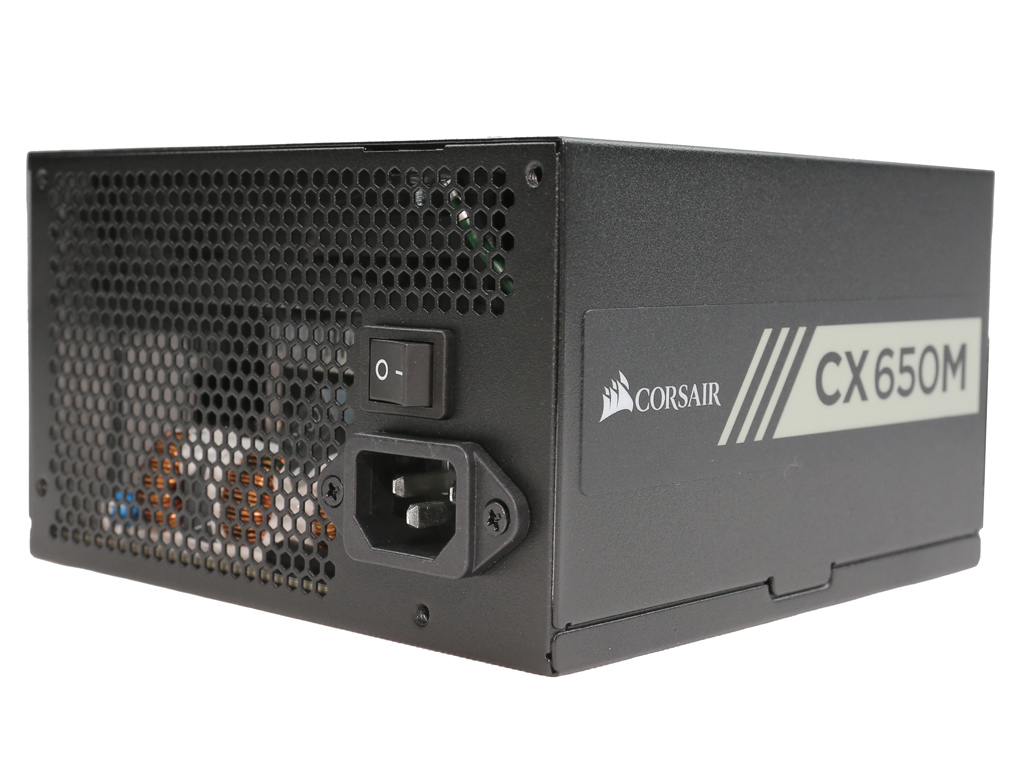Riotoro Onyx 650W PSU Review
Why you can trust Tom's Hardware
Load Regulation, Hold-Up Time & Inrush Current
To learn more about our PSU tests and methodology, please check out How We Test Power Supply Units.
Primary Rails And 5VSB Load Regulation
Load Regulation testing is detailed here.
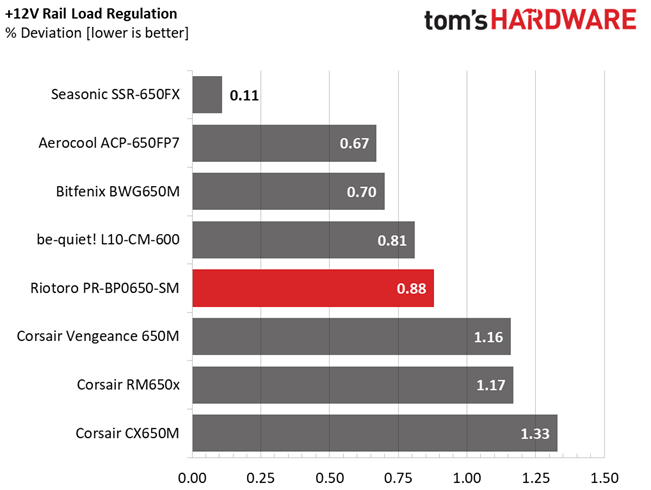
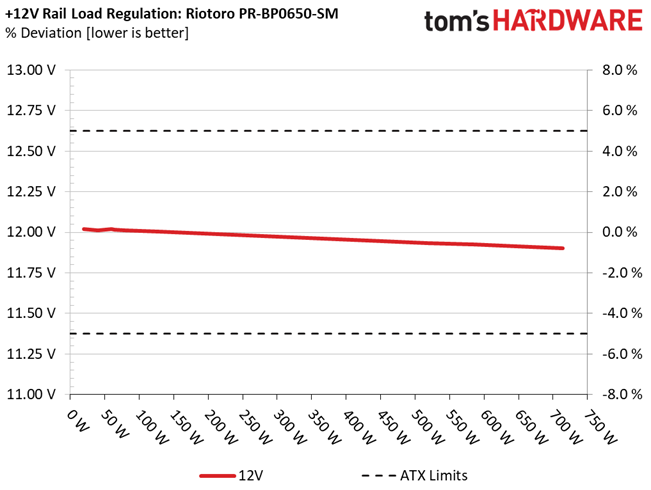
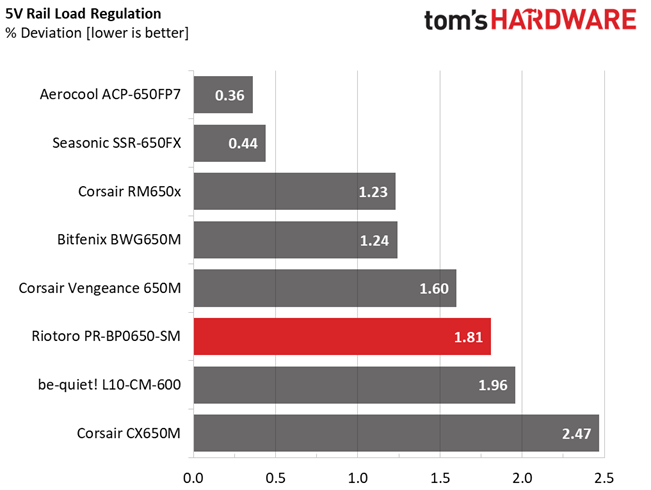
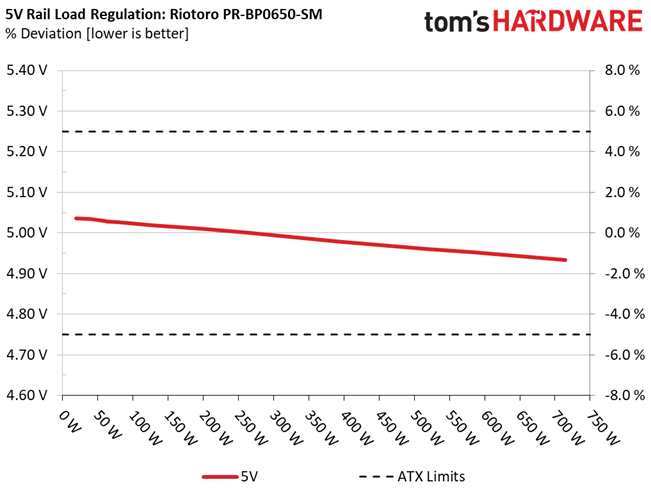
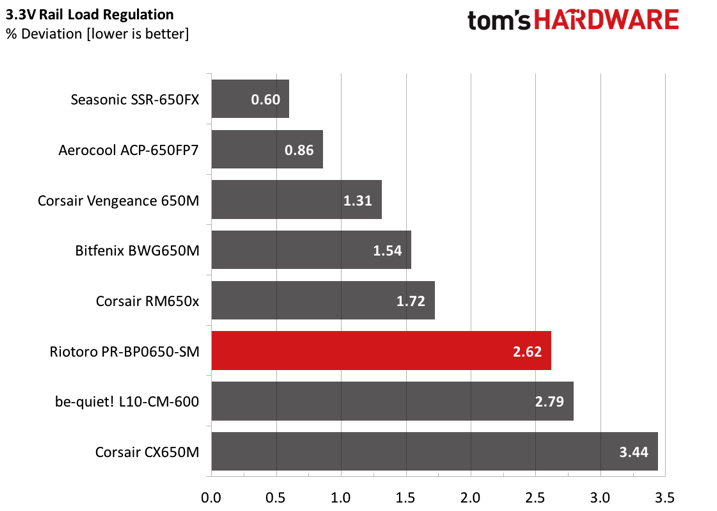
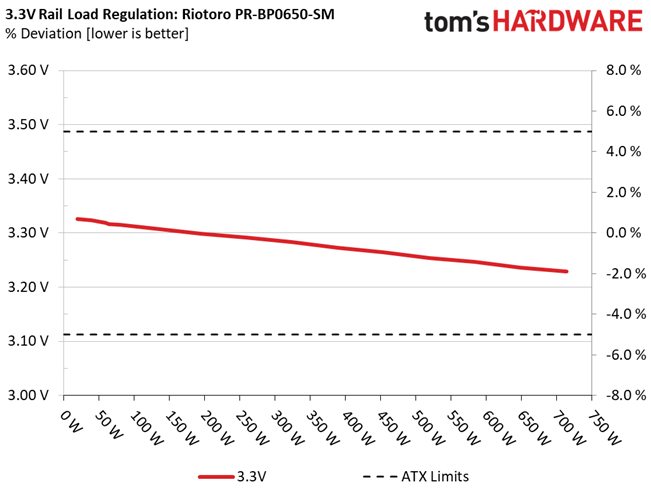
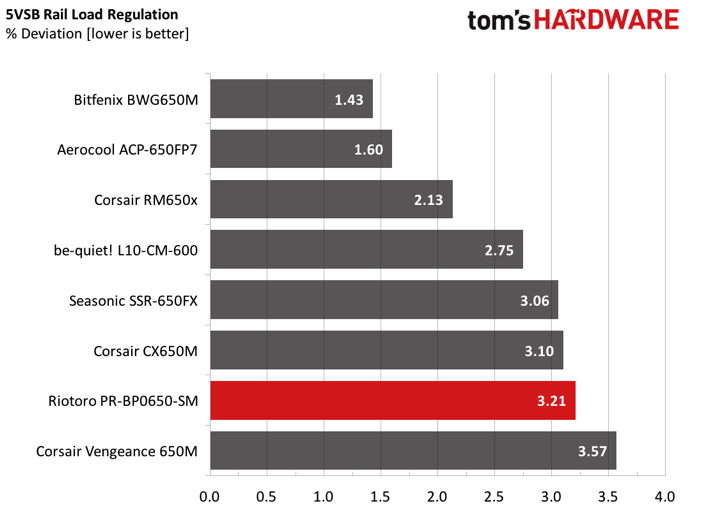
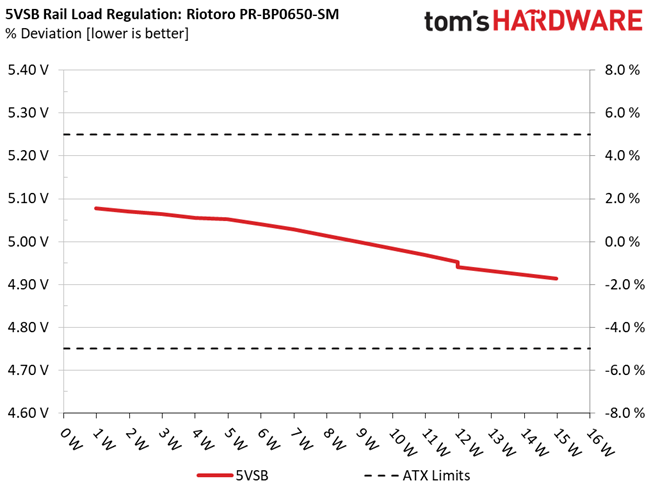
Hold-Up Time
Our hold-up time tests are described in detail here.
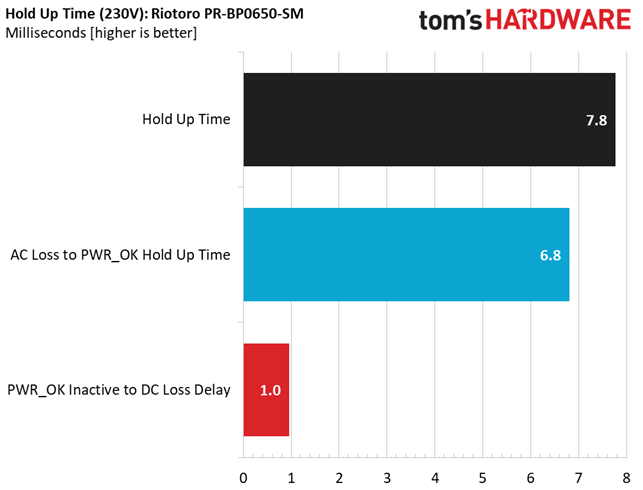
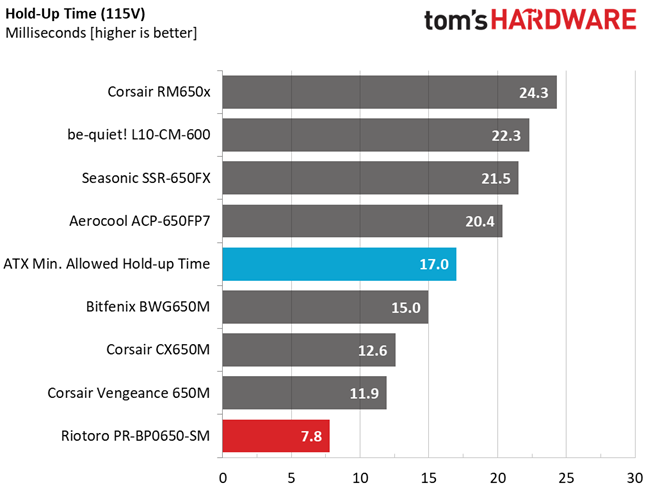
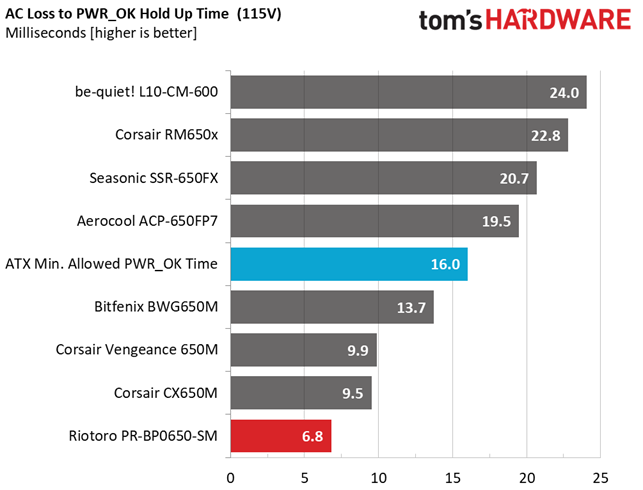
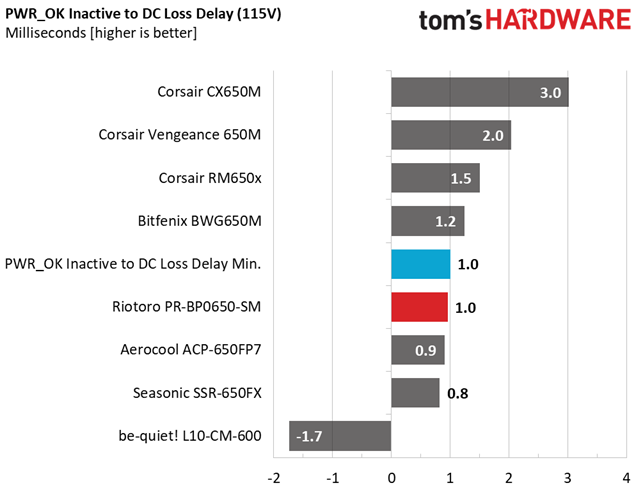
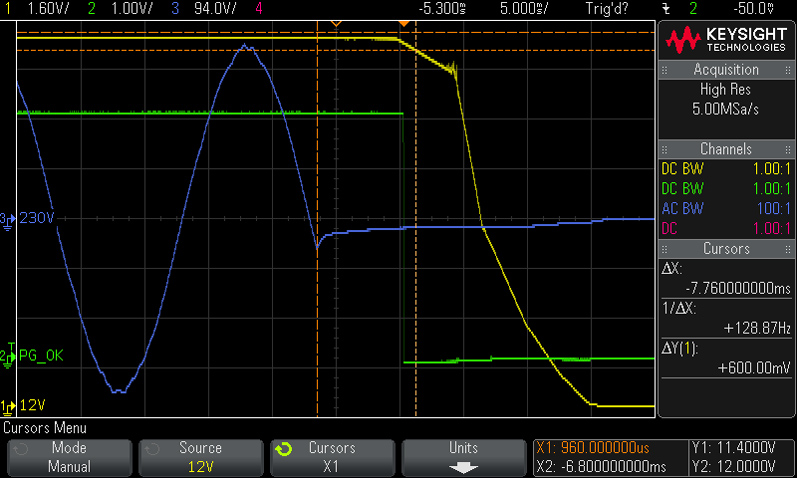
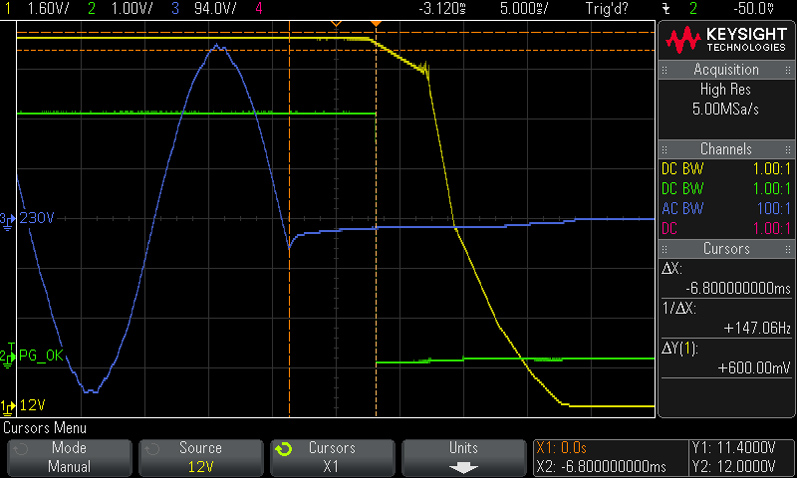
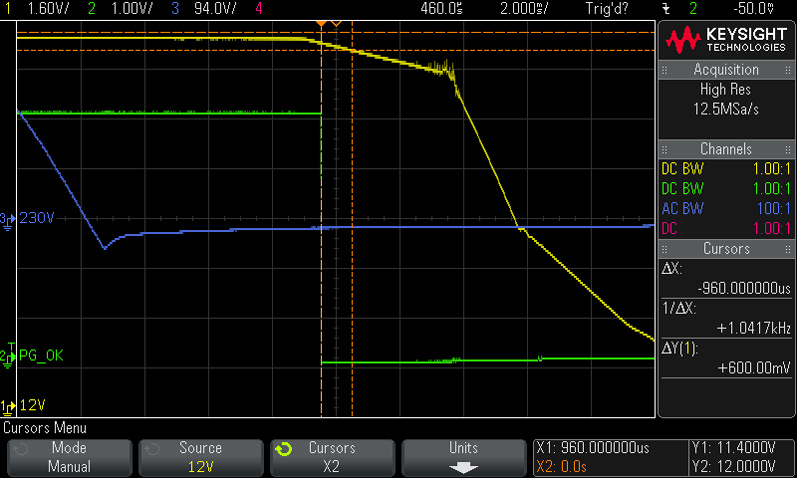
The hold-up time we measured is ridiculously low. GW uses low-capacity bulk caps to save a few bucks, resulting in a hold-up time lower than 8ms. As a point of reference, the ATX spec requires at least 17ms. This is a major downside for this PSU. Great Wall should have used bulk caps with at least double the capacity.
Inrush Current
For details on our inrush current testing, please click here.
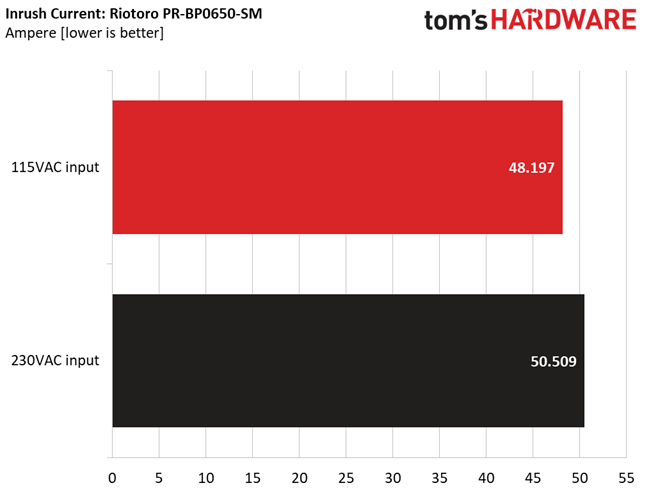
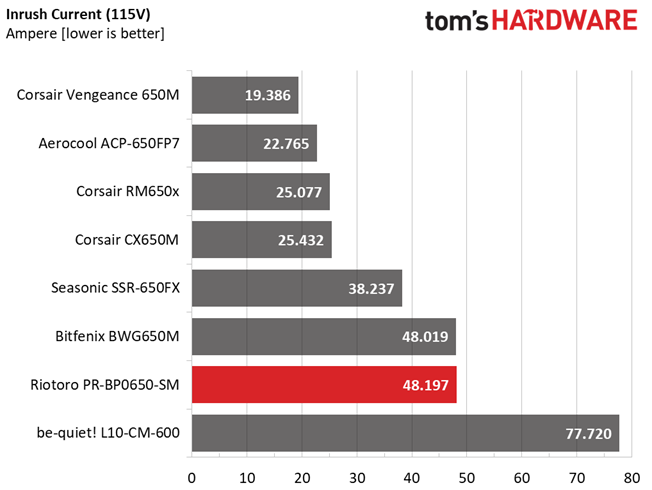
The small NTC thermistor does an average job in restricting the inrush currents.
Load Regulation And Efficiency Measurements
The first set of tests reveals the stability of the voltage rails and the PR-BP0650-SM's efficiency. The applied load equals (approximately) 10 to 110 percent of the PSU's maximum load in increments of 10 percentage points.
Get Tom's Hardware's best news and in-depth reviews, straight to your inbox.
We conducted two additional tests. During the first, we stressed the two minor rails (5V and 3.3V) with a high load, while the load at +12V was only 0.1A. This test reveals whether a PSU is compatible with Intel's C6/C7 sleep states or not. In the second test, we determined the maximum load the +12V rail could handle with minimal load on the minor rails.
| Test # | 12V | 5V | 3.3V | 5VSB | DC/AC (Watts) | Efficiency | Fan Speed | Fan Noise | Temps (In/Out) | PF/AC Volts |
|---|---|---|---|---|---|---|---|---|---|---|
| 1 | 3.595A | 1.985A | 1.989A | 0.984A | 64.749 | 83.209% | 1560 RPM | 32.8 dB(A) | 38.58°C | 0.974 |
| 12.017V | 5.028V | 3.316V | 5.053V | 77.815 | 39.50°C | 115.16V | ||||
| 2 | 8.239A | 2.982A | 2.987A | 1.190A | 129.736 | 87.792% | 1595 RPM | 33.6 dB(A) | 38.99°C | 0.968 |
| 12.003V | 5.018V | 3.308V | 5.040V | 147.777 | 39.94°C | 115.15V | ||||
| 3 | 13.242A | 3.497A | 3.513A | 1.390A | 194.883 | 88.790% | 1680 RPM | 35.2 dB(A) | 39.80°C | 0.976 |
| 11.991V | 5.010V | 3.299V | 5.028V | 219.487 | 41.08°C | 115.15V | ||||
| 4 | 18.242A | 3.998A | 4.007A | 1.595A | 259.724 | 88.914% | 1765 RPM | 36.6 dB(A) | 39.87°C | 0.981 |
| 11.980V | 5.002V | 3.292V | 5.013V | 292.107 | 41.43°C | 115.15V | ||||
| 5 | 22.909A | 5.008A | 5.027A | 1.800A | 324.687 | 88.578% | 1870 RPM | 38.9 dB(A) | 40.33°C | 0.984 |
| 11.969V | 4.990V | 3.283V | 4.998V | 366.554 | 41.92°C | 115.14V | ||||
| 6 | 27.586A | 6.026A | 6.045A | 2.004A | 389.657 | 88.070% | 1870 RPM | 38.9 dB(A) | 40.92°C | 0.986 |
| 11.958V | 4.980V | 3.273V | 4.984V | 442.440 | 42.79°C | 115.14V | ||||
| 7 | 32.272A | 7.040A | 7.075A | 2.209A | 454.579 | 87.360% | 1870 RPM | 38.9 dB(A) | 42.01°C | 0.987 |
| 11.946V | 4.970V | 3.264V | 4.969V | 520.354 | 44.27°C | 115.14V | ||||
| 8 | 36.960A | 8.068A | 8.109A | 2.419A | 519.500 | 86.465% | 1870 RPM | 38.9 dB(A) | 43.10°C | 0.989 |
| 11.935V | 4.960V | 3.254V | 4.952V | 600.823 | 45.68°C | 115.14V | ||||
| 9 | 42.091A | 8.584A | 8.654A | 2.425A | 584.516 | 85.561% | 1870 RPM | 38.9 dB(A) | 44.05°C | 0.991 |
| 11.925V | 4.952V | 3.246V | 4.941V | 683.155 | 47.14°C | 115.14V | ||||
| 10 | 46.979A | 9.103A | 9.178A | 3.046A | 649.325 | 84.361% | 1870 RPM | 38.9 dB(A) | 45.22°C | 0.992 |
| 11.913V | 4.943V | 3.236V | 4.914V | 769.695 | 48.96°C | 115.14V | ||||
| 11 | 52.470A | 9.122A | 9.198A | 3.053A | 714.182 | 83.258% | 1870 RPM | 38.9 dB(A) | 45.94°C | 0.992 |
| 11.902V | 4.934V | 3.229V | 4.905V | 857.789 | 49.96°C | 115.14V | ||||
| CL1 | 0.099A | 16.027A | 16.004A | 0.000A | 133.608 | 81.588% | 1870 RPM | 38.9 dB(A) | 42.75°C | 0.972 |
| 11.989V | 4.987V | 3.280V | 5.035V | 163.759 | 44.86°C | 115.18V | ||||
| CL2 | 54.112A | 1.002A | 1.001A | 1.001A | 658.404 | 85.081% | 1870 RPM | 38.9 dB(A) | 44.49°C | 0.992 |
| 11.923V | 4.966V | 3.260V | 4.982V | 773.858 | 47.66°C | 115.15V |
Load regulation at +12V is tight enough for this category. It's merely decent on the other rails, since at 5V and 3.3V our measurements fall within 3%.
Despite the 40°C rating, this PSU doesn't seem to have a problem delivering its full load (and even more) under very high ambient temperatures and for prolonged periods of time. The fan profile is quite aggressive at high temperatures and loads though; from our fifth test onward, the fan spins at full speed. Nonetheless, the output noise is below 40 dB(A), so it isn't that loud.
Great Wall's platform easily satisfies the 80 PLUS Bronze specification's requirements since it is based on a modern design.
MORE: Best Power Supplies
MORE: How We Test Power Supplies
MORE: All Power Supply Content
Current page: Load Regulation, Hold-Up Time & Inrush Current
Prev Page Teardown & Component Analysis Next Page Efficiency, Temperature & Noise
Aris Mpitziopoulos is a contributing editor at Tom's Hardware, covering PSUs.
-
turkey3_scratch I don't think it's so much the aggressiveness of the fan that contributes to the noise rather than the fact that it's just a noisy fan. There are many other fans that could be spinning at equal RPM and be much quieter while providing the same amount of cooling.Reply
Then again, the noise should not be too severe of a deal in a computer case with other fans (such as case fans at 100% always) contributing more significantly to the net noise.
Edit: Nevermind, dope move by me. I didn't realize the y axis started at 1400RPM, yep, that fan RPM is very high indeed. -
Ne0Wolf7 Reply20135612 said:I don't think it's so much the aggressiveness of the fan that contributes to the noise rather than the fact that it's just a noisy fan. There are many other fans that could be spinning at equal RPM and be much quieter while providing the same amount of cooling.
Then again, the noise should not be too severe of a deal in a computer case with other fans (such as case fans at 100% always) contributing more significantly to the net noise.
I agree, especially when you're like me and have six of them because you were obsessed with filling all of the fan slots on your first build (lol). When the noise finally got to me, I got creative with my intake/ output configuration, and set my PSU to ECO mode (which is no fan). The PSU started roasting, so I rebooted with the fan going and noticed no noise difference whatsoever and the PSU was much cooler (then again, my case fans are sleeve bearing, but still). -
turkey3_scratch Reply20135670 said:20135612 said:I don't think it's so much the aggressiveness of the fan that contributes to the noise rather than the fact that it's just a noisy fan. There are many other fans that could be spinning at equal RPM and be much quieter while providing the same amount of cooling.
Then again, the noise should not be too severe of a deal in a computer case with other fans (such as case fans at 100% always) contributing more significantly to the net noise.
I agree, especially when you're like me and have six of them because you were obsessed with filling all of the fan slots on your first build (lol). When the noise finally got to me, I got creative with my intake/ output configuration, and set my PSU to ECO mode (which is no fan). The PSU started roasting, so I rebooted with the fan going and noticed no noise difference whatsoever and the PSU was much cooler (then again, my case fans are sleeve bearing, but still).
I have a build with like 6 fans that gets noisy because the motherboard only supports so many fans, so I have to plug them into the PSU. But I also have a second build that is dead silent with some Noctuas, and that's the type of build I would want a very silent or at least semi-passive PSU in. -
Ne0Wolf7 Reply20135678 said:20135670 said:20135612 said:I don't think it's so much the aggressiveness of the fan that contributes to the noise rather than the fact that it's just a noisy fan. There are many other fans that could be spinning at equal RPM and be much quieter while providing the same amount of cooling.
Then again, the noise should not be too severe of a deal in a computer case with other fans (such as case fans at 100% always) contributing more significantly to the net noise.
I agree, especially when you're like me and have six of them because you were obsessed with filling all of the fan slots on your first build (lol). When the noise finally got to me, I got creative with my intake/ output configuration, and set my PSU to ECO mode (which is no fan). The PSU started roasting, so I rebooted with the fan going and noticed no noise difference whatsoever and the PSU was much cooler (then again, my case fans are sleeve bearing, but still).
I have a build with like 6 fans that gets noisy because the motherboard only supports so many fans, so I have to plug them into the PSU. But I also have a second build that is dead silent with some Noctuas, and that's the type of build I would want a very silent or at least semi-passive PSU in.
My ATX motherboard only has two fan headers, not sure who was in charge there, haha, but I bought two three way splitters so I could control the speeds. My side panel has two fan slots, and I can only use one of them because the CPU cooler, so I just have this lovely outlet for sound... Its really a blessing too beacsue I have two GPUs so one can never be tarved for air too much but still. A new case and fans are in my future somewhere. -
takeshi7 Can you review the Rosewill Hive 750W? I got one on sale for $60 recently and there aren't any recent reviews for it, and not from any that are as in depth as Tom's Hardware.Reply -
takeshi7 Reply
It's still relevant though. Especially because it's cheaper, more powerful, and has the same 80 Plus rating as this Riotoro unit.20143641 said:@takeshi7, there aren't new reviews for it because it isn't a new PSU. -
turkey3_scratch Reply20144799 said:
It's still relevant though. Especially because it's cheaper, more powerful, and has the same 80 Plus rating as this Riotoro unit.20143641 said:@takeshi7, there aren't new reviews for it because it isn't a new PSU.
"More powerful" can be interpreted many ways. What do you mean by that? -
takeshi7 Reply
I mean 750W > 650W.20144830 said:20144799 said:
It's still relevant though. Especially because it's cheaper, more powerful, and has the same 80 Plus rating as this Riotoro unit.20143641 said:@takeshi7, there aren't new reviews for it because it isn't a new PSU.
"More powerful" can be interpreted many ways. What do you mean by that? -
turkey3_scratch Reply20144901 said:
I mean 750W > 650W.20144830 said:20144799 said:
It's still relevant though. Especially because it's cheaper, more powerful, and has the same 80 Plus rating as this Riotoro unit.20143641 said:@takeshi7, there aren't new reviews for it because it isn't a new PSU.
"More powerful" can be interpreted many ways. What do you mean by that?
Eh, doesn't really mean much of anything if you ask me. It's just what they decided to rate it at. I don't think we'll ever see a Rosewill Hive review. They're older and newer units get reviewed instead.
A high quality lower wattage power supply can be more powerful than a lesser quality higher wattage power supply.
